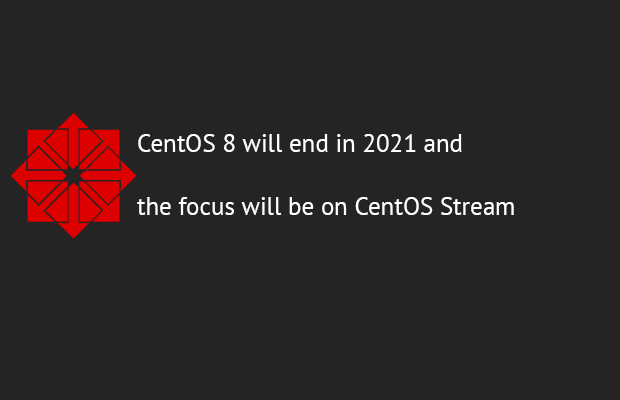CentOS 8 will end in 2021 and the focus will be on CentOS Stream

CentOS - can be decrypted as Community Enterprise Operating System and it is 100% rebuild of RHEL (Red Hat Enterprise Linux). While RHEL costs money, CentOS is offered as a free, community-supported enterprise Linux distribution. Developers and companies that are good at Linux and don't want to pay for RHEL support have always chosen CentOS to save money and get enterprise-grade software. However, the free ride is over. Red Hat announced that CentOS Linux 8, as a rebuild of RHEL 8, will end in 2021. CentOS Stream will continue beyond this date, serving as an upstream for Red Hat Enterprise Linux.
History of the CentOS Project
We saw the first CentOS release in May 2004 called CentOS version 2, which was forked from RHEL 2.1AS (extended server). It became an instant hit with Linux hobbyists, web hosting companies, developers, and the HPC community. CentOS offers free, self-supporting enterprise-grade software, and community support is provided through email mailing lists or online forums. This is a great way to save money on an expensive RHEL contract when you no longer need support or training contracts.
What is CentOS stream?
CentOS stream locations between Fedora and RHEL. In other words, CentOS Stream is a constantly updated distribution for RHEL. It acts as a gateway between Fedora and RHEL:
Upstream ➡️ Downstream ➡️ RHEL
So, we have:
Fedora Linux ➡️ CentOS stream ➡️ RHEL
The CentOS Project shifts focus to CentOS Stream and CentOS Linux 8 ends in 2021
From Announcement Email:
The future of the CentOS project is CentOS Stream, and over the next year we will be moving our focus from CentOS Linux rebuilt Red Hat Enterprise Linux (RHEL) to CentOS Stream, which is being tracked just ahead of the current RHEL release. CentOS Linux 8, as a rebuild of RHEL 8, will end in late 2021. CentOS Stream will continue beyond this date, serving as a fork (development) of Red Hat Enterprise Linux. When CentOS Linux 8 (RHEL8 rebuild) completes, your best option would be to upgrade to CentOS Stream 8, which is a small delta from CentOS Linux 8 and has regular updates like traditional CentOS Linux releases. If you are using CentOS Linux 8 in a production environment and are concerned that CentOS Stream will not meet your needs, we recommend that you contact Red Hat for options.
How will CVEs be handled in CentOS Stream?
Security issues will be updated on CentOS Stream once resolved in the current RHEL release. Obviously, prohibited security releases cannot be published until after this embargo is lifted. Although there will be no SLA, Red Hat engineers will create and test other packages for these releases. If they don't install the updates, the other software they create could be affected and therefore will have to be redone. As such, they are interested in receiving these updates so as not to affect their other builds and there should be no problem getting security updates.
In other words, CentOS Streams users will test RHEL before anyone else and report bugs, but they will not receive security updates until they are fixed in RHEL. A very difficult situation.
Does this mean CentOS Stream is now RHEL BETA test platform?
According to the FAQ:
No. CentOS Stream will receive fixes and features earlier than RHEL. Generally speaking, we expect the CentOS Stream to have fewer bugs and more runtime features than RHEL until these packages make it into the RHEL release.
If you are using CentOS for CI you have no choice because you cannot use RHEL developer licenses. Also note that CentOS Stream will sometimes have different ABI / APIs, so you can no longer test or build EPEL packages locally.
Can the CentOS community continue developing / rebuilding CentOS linux?
Red Hat states that we will not invest hardware, resources or volunteers to work on this, and we will not allow the CentOS branding to be used for such a project, as they believe it dilutes what we are trying to do. with a reorientation to CentOS Stream. However, the code is open source and they won't try to stop anyone from using it or create their own packages from the code.
What will happen with CentOS 7
CentoS 7 will continue to run until the end of the RHEL 7 lifecycle. So there will be no impact on CentOS 7 users.
Conclusion
I think this is the wrong move on the part of Red Hat. The main advantage of CentOS is that it provides 100% binary compatibility with RHEL. At work, we mostly used CentOS for testing as we focus on RHEL, but it saves a lot of money. CentOS has been our "solid test platform" for MySQL, PHP, Nginx, Java, and many other applications. When the application is ready, we will deploy it to the RHEL 8 cluster. Of course, we can get a RHEL developer subscription, but only one free Red Hat developer subscription can be added to a user account for this purpose. So, if you have seven developers, six more developers can create their own accounts at developers.redhat.com. We have to deal with additional accounts. So, if developers want a free RHEL clone, Oracle Linux might be the next best bet.
Many users will not be happy. We may see a new fork as well, but only time will tell. Other Linux distributions such as Ubuntu or Debian LTS will see many new users.
Red Hat has benefited greatly from the huge CentOS community, and this change was not necessary. This is my honest opinion. What do you think? Has this new change affected you, and if so, which Linux distribution will choose to replace CentOS 8?
Source: cyberciti.biz

